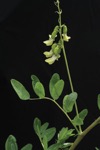| Scientific: | Astragalus membranaceus |
|---|---|
| Other: | Huang Qi, Milk Vetch |
| Family: | Fabaceae |
| Synonym: | Astragalus propinquus |
Astragalus root is used in traditional Chinese medicine (TCM) to tonify spleen and lung qi. It contains steroidal saponins that give it adaptogenic properties to help the body cope with stress and to decrease fatigue. It is an immunomodulator that can boost the immune system to prevent infections like the common cold, but also to treat certain chronic viral infections (e.g. mononucleosis). It stimulates the production of white blood cells to treat low white blood cell count (leukopenia). It is commonly recommended alone or in formulas as adjunct to chemotherapy to decrease side-effects and improve outcomes.
In addition, astragalus has an effect on the cardiovascular system and may benefit mild angina, congestive heart failure and hypertension.
In Asian medicine, used similarly to Panax ginseng but is more often in younger adults. Tonifies spleen and lung qi.
Immune
• poor immune function
• stress
• viral infection
• colds (prophylaxis)
• influenza (prophylaxis)
• mononucleosis
• chronic fatigue syndrome
• autoimmune disease
• allergies
Cancer
• chemotherapy and radiation side-effects
• fatigue
• immunosuppresion (leukopenia, neutropenia)
Cardiovascular
• mild cardiac complaints
• congestive heart failure (CHF)
- arrhythmia
- hypertension
- edema
- angina pectoris
Gastrointestinal
• spleen Qi deficiency
- decrease appetite
- bloating and gas
- diarrhea
• gastric ulcer
Urinary system
• poor renal function
• kidney disease
• nephritis
Dermatologic
• diabetic ulcers
Male reproduction
• male infertility
Other
• hepatitis
• Immunomodulator
• Adaptogen
• Anticancer
• Antiviral
• Cardiotonic
• Inotropic (Positive)
• Antiarrhythmic
• Hepatoprotective
• Nephroprotective
• Antiulcerogenic
• Antiinflammatory
• Antiulcerogenic
• Hypoglycemic
• Antiaging
• Terpenoids
• Steroidal Glycosides (Astragolosides)
• Isoflavones
• Polysaccharides
• Tincture (1:5 in 40% EtOH) 4-8 ml tid
• Decoction (dried herb): 9-30 g qd
• Generally considered safe when used as indicated.
• Contraindications: Suppurative infections.
- Immunosuppresive drugs • unknown effects of co-adminstration but potential for interaction
Barnes J, Anderson LA, Phillipson JD. Herbal Medicines, 3rd ed. London: Pharmaceutical Press, 2007.
Bone K. Principles and Practice of Phytotherapy. Edinburgh: Churchill Livingstone, 2000.
Bone K. A Clinical Guide to Blending Liquid Herbs: Herbal Formulations for the Individual Patient. St Louis, MO: Churchill Livingstone, 2003.
Brinker F. The Toxicology of Botanical Medicines, 3rd ed. Sandy, Oregon: Eclectic Medical Publications, 2000.
Felter HW, Lloyd JU. King's American Dispensatory. 1898. http://www.ibiblio.org/herbmed/eclectic/kings/main.html. Accessed: August 19, 2006.
Hoffman D. Medical Herbalism. Rochester, Vermont: Healing Arts Press, 2003.
Weiss RF. Herbal Medicine. Beaconsfield, England: Beaconsfield Publishers Ltd, 1988.
Williamson EM, ed. Major Herbs of Ayurveda. Edinburgh: Churchill Livingstone, 2002
Disclaimer: This content is subject to change. The information is intended to inform and educate; it does not replace the medical evaluation, advice, diagnosis or treatment by a healthcare professional. www.nhpassist.com © 2014 NDAssist Inc. and/or its affiliates. All rights reserved.

|
Astragalus " Huang Qi "
SummaryAstragalus root is used in traditional Chinese medicine (TCM) to tonify spleen and lung qi. It contains steroidal saponins that give it adaptogenic properties to help the body cope with stress and to decrease fatigue. It is an immunomodulator that can boost the immune system to prevent infections like the common cold, but also to treat certain chronic viral infections (e.g. mononucleosis). It stimulates the production of white blood cells to treat low white blood cell count (leukopenia). It is commonly recommended alone or in formulas as adjunct to chemotherapy to decrease side-effects and improve outcomes. IndicationsSign in requiredActionsSign in requiredConstituentsSign in requiredPosologySign in requiredSafetySign in requiredInteractionsSign in requiredReferencesSign in required |
|---|